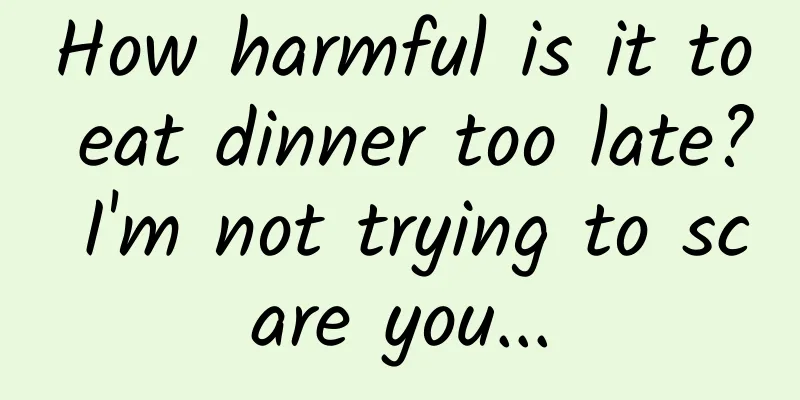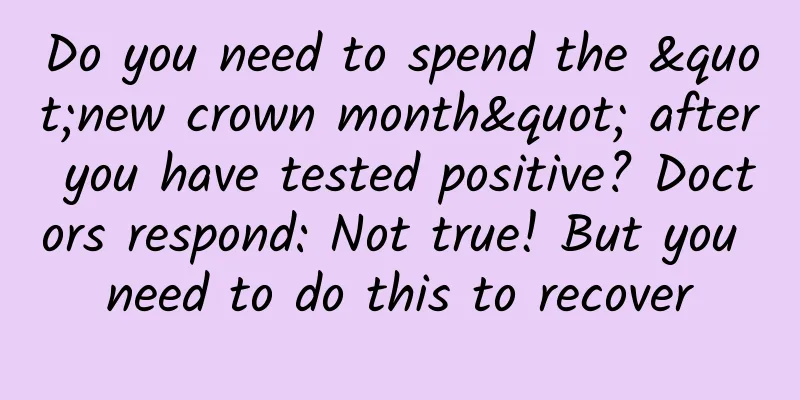How harmful is it to eat dinner too late? I'm not trying to scare you...

|
This article was reviewed by: Pa Lizhe, chief physician of nutrition, former deputy director of the Institute of Chronic Disease Prevention and Health Management, Xinjiang Uygur Autonomous Region Center for Disease Control and Prevention Such an experiment was published in the Journal of Clinical Endocrinology and Metabolism (JCEM) in July 2020. They selected 20 healthy volunteers (10 men and 10 women) with an average age of 26 years old, an average body mass index of 23.2, and a fixed bedtime schedule of 22:00-01:00. The two groups had dinner at 22:00 and dinner at 18:00 respectively, and both were given an equal calorie diet. Then the volunteers went to bed at 23:00. The study found that compared with the volunteers who ate dinner at 18:00, the blood sugar level of the people who ate at 22:00 was higher, and the amount of fat consumed by their bodies was relatively lower. The peak glucose level of the volunteers who ate dinner at 22:00 increased by about 18%, and the amount of fat burned throughout the night decreased by 10%. The researchers explained that changing dinner into a midnight snack can cause nocturnal glucose intolerance, reduce fatty acid oxidation and mobilization, and may promote obesity in the long run. Eating dinner too late is related to at least 6 diseases! 1. Increased risk of obesity Wu Xi, deputy chief physician of the Department of Endocrinology at Huashan Hospital affiliated to Fudan University, said that eating too much at dinner and lack of exercise at night will lead to incomplete digestion and absorption by the body, excessive energy production from metabolism, and increase the risk of obesity and diabetes. 2. More likely to suffer from fatty liver Jia Kai, deputy chief physician of the Department of Gastroenterology at Beijing Chaoyang Hospital, said that the body's metabolic rate decreases at night and there are fewer ways to consume energy, so fat tends to accumulate in the body, thus forming fatty liver. 3. Increased risk of stones Sun Lihong, associate professor of the Nutrition Department of Shanghai University of Traditional Chinese Medicine, said that the human body's peak calcium excretion period is 4 to 5 hours after a meal. If dinner is eaten too late, the person will be asleep when the calcium excretion peak arrives, and a large amount of calcium will be deposited in the urine, which may form urinary stones over time. 4. Not good for gastrointestinal health Sun Lihong also mentioned in the article that if dinner is eaten too late, the time for outdoor activities such as walking after dinner will naturally be reduced accordingly. In addition, the time spent sitting still, such as watching TV or playing with mobile phones, will be prolonged, and the food will not be fully digested. This forces the stomach and intestines to work "overtime", increasing the burden on the digestive system. Over time, the gastrointestinal function of the person will be weakened, leading to gastrointestinal diseases. 5. Increased risk of diabetes A study reported at the 2018 Annual Meeting of the American Heart Association (AHA) found that people who ate more dinner had significantly higher fasting blood sugar (93.7 mg/dL vs 93.0 mg/dL), higher insulin levels (12.4 mU/L vs 11.6 mU/L), and higher HOMA-IR, an indicator of insulin resistance (2.9 vs 2.7). Further analysis showed that after 6 p.m., for every additional 1% of total energy intake, fasting blood sugar, insulin levels and insulin resistance would all rise. 6. Susceptible to cardiovascular disease A study published in the American journal Circulation in 2019 found that women who ate more after 8 p.m. had significantly increased diastolic blood pressure. Researchers remind that dinner needs to be eaten earlier, and the proportion of dinner in the total daily calorie intake should not exceed 30% of the total daily intake, so as to reduce the risk of heart disease. So when is it not too late to eat dinner? Wang Silu, vice president of the Inner Mongolia Nutrition and Health Promotion Association, said that it is recommended to eat dinner between 6 and 8 o'clock, and avoid eating after 9 o'clock in the evening. In addition, it is best to set a fixed time for dinner so that the stomach and intestines will have a fixed "working mode". Dinner should mainly consist of nutritionally balanced, low-calorie, easily digestible foods such as cereals and potatoes, vegetables, fungi, algae, soy products, fish and poultry. Eat "three vegetables and one meat" and chew slowly until you are 70% full. Dinner is also a good opportunity to balance brunch, so in terms of food types, it is best to choose vegetables and meat that are different from brunch. Source: Health Times (ID: jksb2013) The pictures in this article with the "Science Popularization China" watermark are all from the copyright gallery. The pictures are not authorized for reprinting. |
Recommend
Mobike and TikTok actually did this. What do you think of Ofo?
After ofo cooperated with the Minions to launch t...
How much does it cost to attract investors for the Licai Makeup Mini Program?
The advantages of WeChat mini program investment ...
[Practical Case] Promote to millions of users at zero cost!
This article is shared by Zhang Zihao, Operations...
The battle between the two major advertising routes in China
When Hengshui approached us to help it with its b...
WeChat PC version can finally browse Moments! Brand new function experience
[[398284]] Previously, WeChat for Mac has release...
[Precise selling points + excellent creativity] The financial industry will win by promoting like this!
In recent years, Internet finance has developed r...
How to build a community from scratch?
The benefits of Internet traffic are gradually di...
Xueersi’s promotion case study on the activity of bringing up new employees
Xueersi is one of the twin stars in the education...
The stronger your blood vessels, the longer your life! Do these 8 things to slow down the aging of your blood vessels!
Ruan Lei, deputy chief physician of the Departmen...
4 things you must do before launching Google promotion!
Plans can't keep up with changes? It’s becaus...
Is Baidu bidding hosting reliable? Which bidding hosting service is reliable?
Is Baidu bidding hosting reliable? Which bidding ...
Meituan takeaway channel operation skills!
When the mini program was not yet launched, and w...
Shi Media Feed delivery teaching, step-by-step teaching, you must learn how to drive and burn money yourself!
Course Highlights 1. Pure dry goods and high-inte...
Can’t do these 5 things? I advise you not to invest in information flow!
According to the latest data from iResearch MUT, ...
"The tip of the tongue tastes sweet, the back of the tongue tastes bitter"? What you think is the tongue's "taste map" is actually fake
"The tip of the tongue tastes sweet, the bac...









